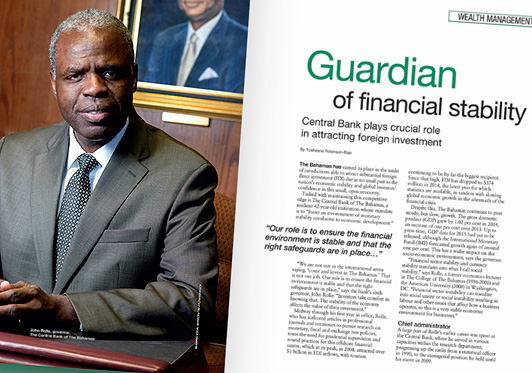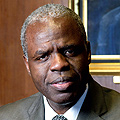| Published: Date: Updated: Author: |
The Bahamas Investor Magazine July 28, 2016 July 28, 2016 Tosheena Robinson-Blair |
The Bahamas has earned its place in the ranks of jurisdictions able to attract substantial foreign direct investment (FDI) due in no small part to the nation’s economic stability and global investors’ confidence in this small, open economy.
Tasked with maintaining this competitive edge is The Central Bank of The Bahamas, a resilient 42-year-old institution whose mandate is to “foster an environment of monetary stability conducive to economic development.”
“We are not out in the international arena saying, ‘come and invest in The Bahamas.’ That is not our job. Our role is to ensure the financial environment is stable and that the right safeguards are in place,” says the bank’s sixth governor, John Rolle. “Investors take comfort in knowing that. The stability of the economy affects the value of their investment.”
Midway through his first year in office, Rolle, who has authored articles in professional journals and continues to pursue research on monetary, fiscal and exchange rate policies, touts the need for prudential supervision and sound practices for this offshore financial centre, which at its peak, in 2008, attracted over $1 billion in FDI inflows, with tourism continuing to be by far the biggest recipient. Since that high, FDI has dropped to $374 million in 2014, the latest year for which statistics are available, in tandem with slowing global economic growth in the aftermath of the financial crisis.
Despite this, The Bahamas continues to post steady, but slow, growth. The gross domestic product (GDP) grew by 1.02 per cent in 2014, an increase of one per cent over 2013. Up to press time, GDP data for 2015 had yet to be released, although the International Monetary Fund (IMF) forecasted growth again of around one per cent. This has a wider impact on the socio-economic environment, says the governor.
“Financial sector stability and currency stability translates into what I call social stability,” says Rolle, a former economics lecturer at The College of The Bahamas (1996-2001) and the American University (2008) in Washington, DC. “Financial sector instability can translate into social unrest or social instability resulting in labour and other issues that affect how a business operates, so this is a very stable economic environment for businesses.”
Chief administrator
A large part of Rolle’s earlier career was spent at the Central Bank, where he served in various capacities within the research department, progressing up the ranks from a statistical officer in 1990, to the managerial position he held until his move in 2009.
From 2009 to 2012, Rolle, a chartered financial analyst, was seconded to the executive board of the IMF where he served as a senior advisor to the executive director for Canada, Ireland and the Caribbean constituency. In this role, he was a principal advisor on economic policy matters, supporting advocacy on behalf of Caribbean countries.
A former financial secretary in the Ministry of Finance (2012-2015), Rolle spent the last three years as a chief administrator spearheading the implementation of the government’s fiscal reform initiatives, which included the introduction of value added tax (VAT), strengthening of tax administration systems and enhancing expenditure control frameworks.
In January, Rolle took over the reins at Central Bank from Wendy Craigg, the first female governor who served a 10-year tenure and went on to assume an economic policy advisor post in the Office of the Prime Minister.
Changing roles
As the Central Bank’s governor, it is Rolle’s job to keep the economy running smoothly by manipulating the flow and supply of money and credit in the banking system. A fundamental part of the bank’s overall monetary policy objective is to maintain the fixed parity between the Bahamian and US dollars, which has been the case since independence in 1973. Consequently, the administration of foreign exchange plays a pivotal role in safeguarding the country’s economic stability.
The Central Bank’s supervisory functions entail both micro and macro-prudential supervision. Specifically, micro-prudential supervision includes on and off-site surveillance of the soundness of individual institutions, according to Rolle.
In contrast, he adds, macro- prudential supervision consists of the bank’s monitoring of the exposure to systemic risk and identifying potential threats to financial stability arising from macroeconomic or financial market developments, while promoting confidence in the financial system through the broad-based implementation of policies and standards that are in keeping with international best practices for supervision and regulation.
“Throughout the world, regulators have had to introduce new tools and methods for monitoring and assessing the health of banks and so we have to adopt those same tools. We constantly have to ensure that there is knowledge and skill-set in that area to deal with those kinds of assessments.”
Maintaining national prosperity is proving to be a delicate balancing act due to the volatility in the global financial landscape. With external shocks coming from multiple sources, Central Bank supervision has become increasingly more complex given recent international attention to offshore financial jurisdictions.
The banking/financial sector is in a state of transition having to adapt to a new normal in terms of cooperation among cross-border regulators and foreign tax authorities, all the while maintaining its competitive edge.
“Although the investment climate is favourable, there is an element of adjustment going on in the financial sector where service providers are, in some cases, looking at the kind of products they’re offering, how they can provide value to foreign clientele in a more open setting where tax minimization is not a driving objective,” says Rolle, who holds graduate degrees in economics from the American University in Washington, DC, and Carleton University in Ottawa, Canada.
According to the governor, much energy is being invested to ensure The Bahamas adopts new international banking standards as quickly as they emerge. But even greater attention is being paid to the creation of regulations and laws that enable the financial services sector to introduce new products and innovations.
The financial system is well- functioning and the regulatory environment “robust,” says Rolle. “We have very sound regulations and laws governing the financial sector that stand up well in terms of the comfort and confidence they provide to those interacting with our financial centre.” Still, there is an acute awareness that the regulatory landscape of The Bahamas has to continue to evolve. That calls for regulators “plugging in” to important international bodies driving global regulatory changes.
In the foreseeable future the new governor is expected to move to relax foreign exchange controls, increasing commercial flexibility as it relates to foreign exchange transactions. The idea is to lessen the administrative cost of doing business. Over time, Rolle wants a more streamlined administration of exchange controls in so far as trade is concerned, increasing the ability to make payments for trade and other transactions.
Facilitating investments
Transparent regulations, modern infrastructure and an educated workforce help to create a framework attractive to investors. Moreover, certain policy provisions, such as profit repatriation, provide further comfort. “That’s one of the things that has never been a challenge for foreign investors,” says Rolle. “Investors want to know they can get their profits out and repatriate funds as they earn them.”
With regards to the ease of doing business in The Bahamas, Rolle believes there is room for improvement as evident in the World Bank Group’s global ranking this year, which placed The Bahamas 106th out of 189 economies.
“Investors expect a business-friendly environment. They want to see continued improvements in the ease of doing business,” says Rolle. “There is acknowledgement and recognition that if you are interacting with regulatory or government agencies you want to see swift responses.You want to be able to know what is expected and see, in many cases, documentation of what’s expected so the transparency of the administration of various processes is not in question.”
Foreign investors expect a highly skilled workforce, which Rolle believes The Bahamas possesses. To remain competitive, he says the country must continue to invest in its “education infrastructure” as investors require a reservoir of educated citizens to carry out their work. In so far as the financial services sector demands to relax immigration work policies for certain professionals, Rolle says “a meeting of the minds must take place” between what Bahamians expect in an immigration policy versus what it wants for the nation’s second largest industry and determine whether the two are compatible.
As for the Central Bank, the governor says it will evolve as its priorities shift. “Technology has caused a lot of changes,” says Rolle. “All of those trends will continue to drive how and what this bank looks like. We stack up very favourably against other central banks in the region. We are highly regarded and respected by our peers.”










